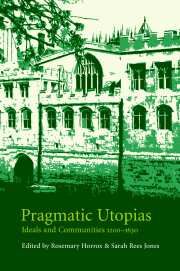Book contents
- Frontmatter
- Contents
- Preface
- List of abbreviations
- Richard Barrie Dobson: an appreciation
- 1 ‘If heaven be on this earth, it is in cloister or in school’: the monastic ideal in later medieval English literature
- 2 The ‘Chariot of Aminadab’ and the Yorkshire priory of Swine
- 3 Godliness and good learning: ideals and imagination in medieval university and college foundations
- 4 Hugh of Balsham, bishop of Ely 1256/7–1286
- 5 A cruel necessity? Christ's and St John's, two Cambridge refoundations
- 6 Coventry's ‘Lollard’ programme of 1492 and the making of Utopia
- 7 Thomas More's Utopia and medieval London
- 8 Social exclusivity or justice for all? Access to justice in fourteenth-century England
- 9 Idealising criminality: Robin Hood in the fifteenth century
- 10 Fat Christian and Old Peter: ideals and compromises among the medieval Waldensians
- 11 Imageless devotion: what kind of an ideal?
- 12 An English anchorite: the making, unmaking and remaking of Christine Carpenter
- 13 Victorian values in fifteenth-century England: the Ewelme almshouse statutes
- 14 Puritanism and the poor
- 15 Realising a utopian dream: the transformation of the clergy in the diocese of York, 1500–1630
- Bibliography of Barrie Dobson's published works
- Index
6 - Coventry's ‘Lollard’ programme of 1492 and the making of Utopia
Published online by Cambridge University Press: 01 July 2009
- Frontmatter
- Contents
- Preface
- List of abbreviations
- Richard Barrie Dobson: an appreciation
- 1 ‘If heaven be on this earth, it is in cloister or in school’: the monastic ideal in later medieval English literature
- 2 The ‘Chariot of Aminadab’ and the Yorkshire priory of Swine
- 3 Godliness and good learning: ideals and imagination in medieval university and college foundations
- 4 Hugh of Balsham, bishop of Ely 1256/7–1286
- 5 A cruel necessity? Christ's and St John's, two Cambridge refoundations
- 6 Coventry's ‘Lollard’ programme of 1492 and the making of Utopia
- 7 Thomas More's Utopia and medieval London
- 8 Social exclusivity or justice for all? Access to justice in fourteenth-century England
- 9 Idealising criminality: Robin Hood in the fifteenth century
- 10 Fat Christian and Old Peter: ideals and compromises among the medieval Waldensians
- 11 Imageless devotion: what kind of an ideal?
- 12 An English anchorite: the making, unmaking and remaking of Christine Carpenter
- 13 Victorian values in fifteenth-century England: the Ewelme almshouse statutes
- 14 Puritanism and the poor
- 15 Realising a utopian dream: the transformation of the clergy in the diocese of York, 1500–1630
- Bibliography of Barrie Dobson's published works
- Index
Summary
At the Michaelmas session of the 1492 leet court of the city of Coventry a series of ordinances were enacted which culminated in the provision that no ‘senglewoman’ below the age of fifty and capable of working should live by herself, but rather should ‘go to seruice till they be maried’. This ordinance appears to be unique to Coventry. The purpose of this present paper is to explore and explain the context in which this legislative programme and this particular ordinance arose. Of no small importance are the broader economic conditions prevailing in later fifteenth-century Coventry, a city experiencing deep recession culminating in the early sixteenth-century crisis made famous by Charles Phythian-Adams's magisterial monograph. Equally important, however, are the changing religious mores, cultural values and gender ideologies of the city's magistrates or leet jurats, members of what turns out to be a divided and embattled mercantile oligarchy. It is our contention here that the Michaelmas 1492 programme, revised and extended at Michaelmas 1495, represents a radical reform manifesto associated with one particular faction characterised by marked Lollard sympathies. The ordinance directed at single women was thus a key plank in a utopian vision of a godly and ordered society in which all knew their place and all worked to the common good.
Constraints of time and space necessarily limit our exploration of the broader cultural and socio-economic contexts of the 1492 legislation.
- Type
- Chapter
- Information
- Pragmatic UtopiasIdeals and Communities, 1200–1630, pp. 97 - 116Publisher: Cambridge University PressPrint publication year: 2001
- 2
- Cited by



